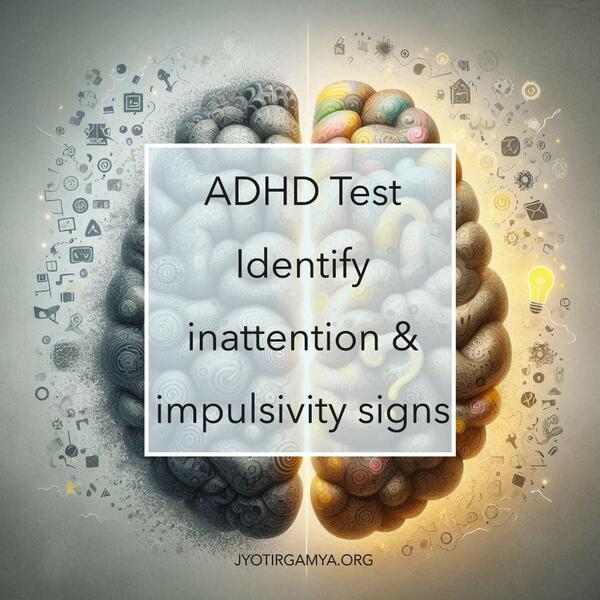ADHD Test: Identify Inattention & Impulsivity Signs
Wondering if ADHD is affecting your daily life? Use our simple tool to uncover key symptoms of inattention and impulsivity in minutes.
ADHD symptoms, such as forgetfulness and impulsivity, can make life challenging. From keeping track of tasks to maintaining focus, these difficulties might signal ADHD. Our tool is here to guide you toward understanding your tendencies.

Why Use Our ADHD Test?
- Quick Discovery: Learn how often symptoms like restlessness and difficulty prioritizing affect your day.
- Personalized Insights: Understand your behavioral patterns and their potential impacts on your work and relationships.
- Actionable Steps: Gain clarity to decide whether further professional evaluation or support is right for you.
What to Expect:
- Instant Feedback: Get immediate results highlighting your tendencies toward ADHD-related traits.
- Clear Next Steps: Recommendations for exploring professional evaluation or self-help resources.
- No Pressure, Just Clarity: The quiz is a judgment-free tool for self-reflection.
How It Works:
- Answer 20 Simple Questions: Based on everyday experiences.
- Get Immediate Results: Understand tendencies toward inattention and impulsivity.
- Explore Next Steps: Whether it’s resources or evaluation, we’ll guide you.
Your Time is Valuable: Here’s Why This Quiz is Worth It:
- Insightful Results: Tailored feedback to understand your experiences.
- No Cost, No Strings Attached: 100% free and confidential.
- Practical Guidance: Suggestions to help you manage symptoms effectively.
Don’t Let ADHD Symptoms Go Unchecked
ADHD doesn’t have to control your life. Start your journey to understanding and managing it today. Take the first step with our free, personalized ADHD Symptom Checker.
Start Your Quiz Now—It’s Fast, Free, and Insightful!
Frequently Asked Questions on our ADHD Test
This test helps assess tendencies related to focus, impulsivity, and organization. It can give insight into how you manage daily tasks, distractions, and decision-making processes.
This test is suitable for anyone interested in understanding how they handle distractions, task management, and impulsivity. It is especially useful for individuals who feel they struggle with attention, focus, or organization.
The test consists of 20 questions and should take approximately 5 to 10 minutes to complete.
Each answer choice reflects a different level of difficulty or frequency in how you experience the situations presented. The answers are designed to gauge how often you encounter these issues.
While this test can provide insights into tendencies that may align with symptoms of ADHD or other focus-related challenges, it is not a diagnostic tool. For a professional diagnosis, consult with a healthcare provider.
Your answers may highlight areas where you experience more difficulty or challenges. If you find that many of your responses lean towards impulsivity, distraction, or disorganization, it might be helpful to seek further evaluation or support.
Yes, you can retake the test at any time to track changes or shifts in your behavior over time.
If you are concerned about the results or how they relate to your daily life, consider consulting a mental health professional for advice or to explore coping strategies.
Common signs of ADHD include difficulty focusing, impulsivity, disorganization, forgetfulness, restlessness, and trouble following through on tasks. If you relate to many of these signs, consider discussing them with a healthcare provider.
If you frequently experience issues with attention, hyperactivity, or impulsivity that impact your daily life, it may indicate ADHD. However, only a healthcare professional can provide an accurate diagnosis through a thorough evaluation.
Yes, there are three types of ADHD: Inattentive Type, Hyperactive-Impulsive Type, and Combined Type. The symptoms vary, but all types involve challenges with focus, impulse control, and organization.
Essential Reads
How to Deal with Anxiety: Expert Advice and Techniques
Play Therapy: A Powerful Tool for Mental Health
Insights on Therapy, Growth, and Decision-Making from a Mental Health Community Discussion
Mastering the Six Core Skills of ACT for Psychological Flexibility
Achieving Work-Life Balance with Acceptance and Commitment Therapy (ACT)
The Benefits of Mindfulness in Acceptance and Commitment Therapy
Managing Anxiety with ACT: Techniques, Effectiveness, and Practical Strategies
Step-by-Step Guide to Defining Your Values in Acceptance and Commitment Therapy
Embracing Committed Action to Achieve your Goals
The Power of Acceptance in ACT: Fostering Well-being and Personal Growth
Cognitive Defusion Techniques from ACT: How to Distance Yourself from Unhelpful Thoughts
Acceptance vs. Cognitive Defusion - A Practical Guide to Develop Psychological Flexibility
How Hypnotherapy Can Help You Heal Jealousy and Insecurity
A Guide to Understanding, Accepting, and Defusing Your Ego
Sound Therapy for Learning and Pain
Want to stay connected? Here’s our twitter.
Or subscribe to our monthly newsletter containing tools for body, mind, and goal.